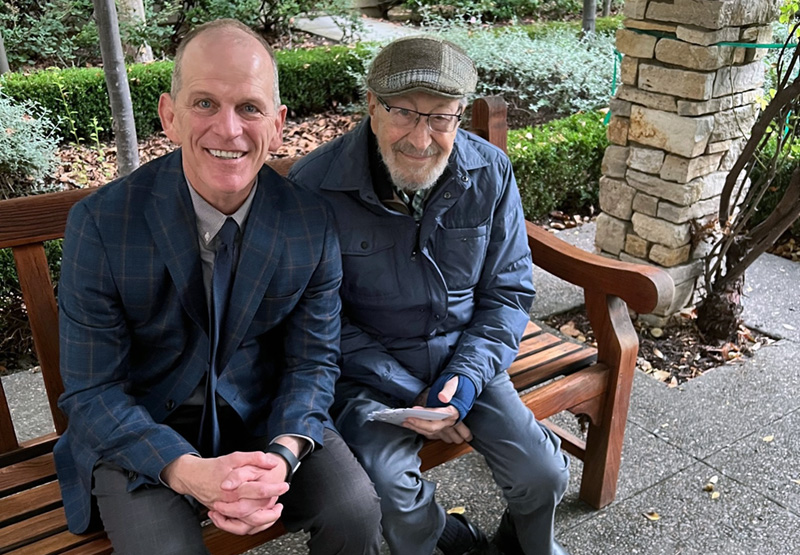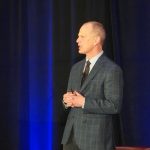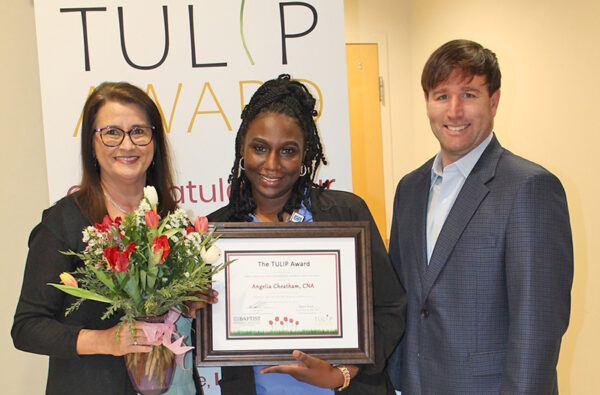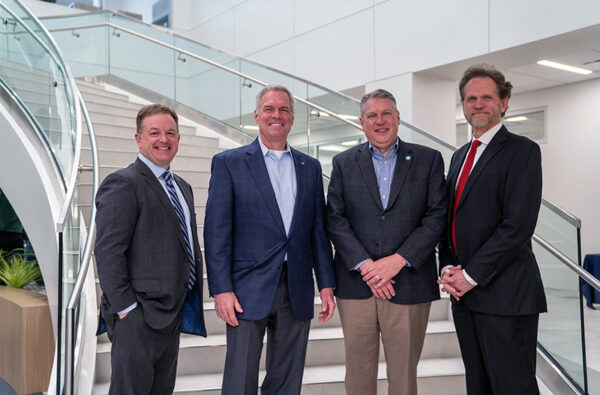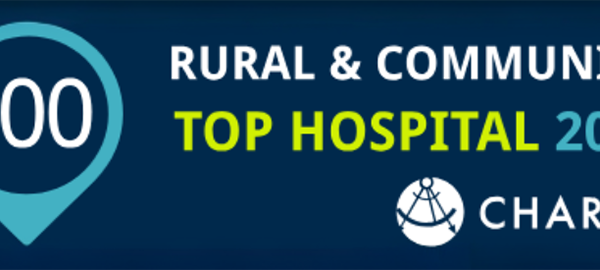Baptist Memorial Health Care’s Vice President and Chief Improvement Officer, Skip Steward, presented to a packed audience at the 2022 Lean Healthcare Academic Conference at Stanford in Palo Alto, California, on Oct. 11 and 12. We spoke with him to learn more about the conference and the elements that make up our Baptist Management System (BMS).
Will you tell us about your experience at the Lean Healthcare Academic Conference at Stanford?
I delivered a keynote presentation, “Why are Relationships so Important at Work?” It focused on Training Within Industry (TWI), Job Relations (JR) and Humble Inquiry.
Humble Inquiry was developed by Professor Emeritus at the Massachusetts Institute of Technology (MIT) Sloan School of Management, Dr. Edgar Schein, whose book on the topic – Humble Inquiry, The Gentle Art of Asking Instead of Telling – is in its second edition.
Following my presentation, Dr. Schein joined me virtually while Peter Schein, strategy consultant in Silicon Valley, and John Shook, senior advisor at Lean Global Network, joined me on stage for a deeper discussion about complex socio-technical systems.
Dr. Schein is one of the world’s foremost authorities on culture. He and his son, Peter, have a combined 100-plus years of experience studying, thinking, speaking and writing about culture. I have developed a friendship with Dr. Schein and Peter during the last two years, and I’ve also known John Shook for many years. He is a well-known expert on Lean management who worked with Toyota for 11 years in Japan and the U.S.
On day two of the conference, I hosted a breakout session, “TWI – Applying Training within Industry to Healthcare.” It covered TWI Job Instruction, TWI Job Relations and TWI Job Methods.
What did the conference attendees share with you?
I was surprised and encouraged by the number of individuals from all over the U.S., Australia, the Netherlands, Great Britain and Ireland who came up to me during the conference to say they keep track of what we’re doing at Baptist and have followed BMS from a distance. They watch our videos and listen to our weekly podcast.
 Our BMS YouTube Channel features six videos we created on Humble Inquiry with the Scheins, and four videos on Culture. And we just recorded our 100th episode last week of Connecting the Dots, the official podcast for BMS. I host Connecting the Dots with Baptist Chief Medical Information Officer Dr. Jake Lancaster and Baptist Chief Quality Officer and Chief Medical Officer for Baptist DeSoto and Baptist Tipton Dr. H.F. Mason.
Our BMS YouTube Channel features six videos we created on Humble Inquiry with the Scheins, and four videos on Culture. And we just recorded our 100th episode last week of Connecting the Dots, the official podcast for BMS. I host Connecting the Dots with Baptist Chief Medical Information Officer Dr. Jake Lancaster and Baptist Chief Quality Officer and Chief Medical Officer for Baptist DeSoto and Baptist Tipton Dr. H.F. Mason.
Were you involved with the Baptist Management System from the beginning?
Yes. I started it nine years ago with our Executive Vice President and Chief Operating Officer Dr. Paul DePriest. The mindset is there’s nothing within Baptist that cannot be improved, whether that’s a financial system, an HR system, food delivery service or patient care.
Do you find that physicians are interested in improvement?
I sure do. Dr. Mason and Dr. Lancaster are great role models of that. It all started with Dr. DePriest. He was the inspiration for BMS.
There are many physicians throughout Baptist who are very passionate about improvement. We gain new students of improvement on a regular basis. They understand that you don’t learn it in one classroom setting or by reading one book. You must be willing to be a student of the improvement science.
What is the Baptist Management System?
The Baptist Management System is our system for patient care excellence and continuous improvement. It’s based on the three interdependent dimensions of Purpose, People and Process (3Ps). We also have 11 Guiding Principles that are embedded in the 3Ps, and they influence the different elements that make up BMS. The 11 Guiding Principles include respect, humility, trust, empathy, seeking perfection, process focus, scientific thinking, quality at the source, flow and pull, constancy of purpose and systemic thinking.
The BMS focuses on creating a holistic management system built on the 3Ps. It uses Lean methodology for managing the 3Ps. Lean originated with the Toyota Production System (TPS). No company on Earth has had a better improvement system and been more consistent than Toyota has been for the last 75 years.
There are several elements that make up BMS, such as TWI – a method of training to spark continuous improvement and collaborative training within teams. TWI is powerful, and perhaps no other health care system uses it more than Baptist. We just had our 7th Annual Baptist TWI Summit in October. We’ve also had great partners, like Utah-based Intermountain Healthcare, that we helped get started with TWI.
BMS also utilizes elements like the Improvement Kata/Coaching Kata, a set of routines to assist in the development of scientific thinking.
Could you share more about how TWI is used?
Job Instruction, Job Relations and Job Methods are the three legs to the stool that we call TWI. TWI Job Instruction helps create a standard behavior so that we’re all doing something like starting an IV or putting in a Foley catheter in the same way. TWI uses the science of routines and habits to create new routines and habits to reduce errors.
TWI Job Relations teaches you how to respond to “people” challenges in an objective and respectful way. It’s a beautiful match with Humble Inquiry, a method of building a relationship that leads to more open communication.
TWI Job Methods helps us get amazing ideas from front-line workers on how to improve a particular process or task. For example, maybe we need improvement on how the patients flow through the Emergency Department. We may start in the triage area, and TWI Job Methods helps real people who do the real work dissect some of that work in that small area of triage. I call it an idea generator because it just boils up all these ideas.
Is there anything you’d like to add?
I greatly appreciate all the work every Baptist team member does with BMS. One of the areas that I get most excited about is what we call BMS Reviews. We have approximately 120 volunteers throughout Baptist called BMS Ambassadors. Once a year, they review other entities through the lens of our 11 Guiding Principles. Each entity reviewed receives a feedback report highlighting strengths and opportunities for improvement.
We’re going to continue to grow and expand. I want to empower the people who are working on the front lines and those who are managing the entities. I want to empower them where they’re at because there’s lots of moving parts in the BMS.
I think the future of this management system is very bright!

